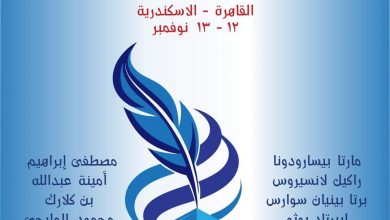Director of Cervantes in Cairo, José Manuel Alba: Building Bridges of Communication Requires Joint Efforts Backed by the Cervantes.

By Doaa Mohamed
José Manuel Alba, Director of the Spanish Cultural Center (Cervantes Institute in Cairo), emphasized the institute’s dedication to fostering collaborative efforts with both local and international cultural institutions. This partnership serves as a cornerstone in establishing strong communication between the Egyptian community and the 21 Spanish-speaking countries. These countries’ cultural activities are supported by the center in cooperation with their diplomatic missions in Egypt.
During a press conference held at the Cervantes Institute in Cairo, Alba stated, “The center is committed to organizing and supporting events that bring together Egyptian artists and activists, as well as those from Spanish-speaking nations. This long-standing involvement includes participation in local festivals like the ‘She Arts Festival’ at the end of this month, the Cairo Jazz Festival in November, the European Film Panorama, and the ‘Sadeem Festival,’ which gathers artists from various countries for a creative residency in Egypt, culminating in collaborative works.”
The center also works closely with Egyptian cultural institutions, such as the Academy of Arts, particularly in organizing the Microteatro Festival. Additionally, they partner with the Bibliotheca Alexandrina to host numerous joint events in Cairo and Alexandria.
Regarding efforts to promote the Spanish language and support its learners, Alba highlighted that “the center offers educational activities tailored to students and those engaged in Spanish studies. These initiatives aim to spread the Spanish language and foster cross-cultural dialogue, in collaboration with Spanish departments at Egyptian universities. This is achieved through specialized courses and the Diploma of Spanish as a Foreign Language (DELE) exam, which enhances opportunities for studying at Spanish universities and opens new career prospects in Spanish-speaking countries.”
On the international level, Alba noted that “the ongoing collaboration between the Cervantes Institute and the European Union National Institutes for Culture (EUNIC), of which Cervantes is a member, plays a vital role in geographically expanding cultural events. This partnership helps broaden the dialogue and reach culture and art enthusiasts across Egypt. While the Cervantes Institute operates through its branches in Cairo and Alexandria, its partnership with EUNIC allows for a wider presence throughout the country’s governorates.”
Miguel Grajales, the center’s cultural activities coordinator, added, “Our goal as a cultural center is not just to showcase how beautiful and fascinating Spanish-speaking culture is, but to encourage a creative and reciprocal dialogue with local artists, professionals, and technicians. This approach promotes cultural exchange and helps find points of intersection and cultural commonalities with the Egyptian community.”
Miguel also stressed the importance of joint efforts in enhancing the effectiveness of cultural initiatives, stating, “Such multifaceted collaboration is at the core of the Cervantes Institute’s mission since its establishment by the Spanish government in 1991. Its strategic goal is to coordinate and support Spain’s global outreach, particularly in the areas of Spanish language instruction, promotion of Spanish culture, and identifying areas of cultural convergence. None of this can be achieved without strong cooperation with various local and international public and private entities.”



